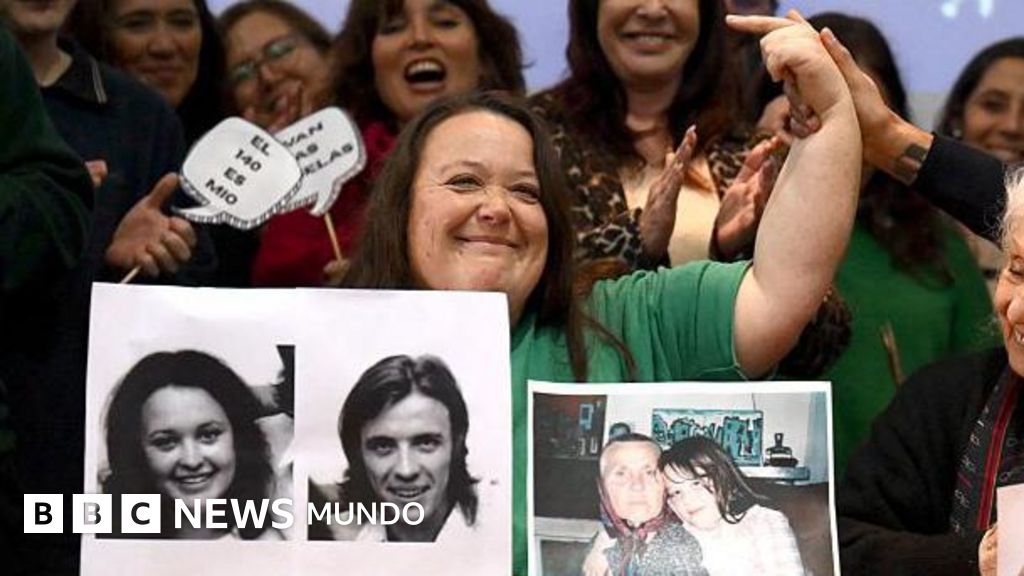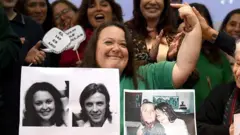

Image source, Luis Robayo/AFP via getty images
-
- Author, Vanessa Buschschlüter
- Author's title, BBC News
A man who was separated by his mother's force when he was a newborn during the Argentine military dictatorship and was raised by strangers was found after 48 years thanks to a DNA test.
Adriana Metz, her sister who had been looking for him for decades, said at a press conference on Monday that he could talk to him for the first time by phone last week.
Metz managed to find him with the help of Grandmothers of Plaza de Mayo, a group of women who have been trying to bring together the approximately 500 babies who were kidnapped by the Military Board during the dictatorship.
Metz's brother, whose identity has not been publicly revealed to protect his privacy, is the missing grandson number 140 that the group finds.

Image source, Luis Robayo/AFP via getty images
In a press conference, the founder and president of the grandmothers of the Plaza de Mayo, Estela de Carlotto, read a statement while the public applauded and cheered.
“Today we welcome the son of Graciela Alicia Romero and Raúl Eugenio Metz,” said the 94 -year -old woman, sitting next to a radiant Adriana Metz.
The finding of man was found with the joint work with two public entities, the National Commission for the Right to Identity (CONADI) and the National Bank of Genetic Data, which according to one of the spokesmen in the event work “in precarious conditions and with enormous difficulties.”
Although the man found was not present, the Grandmothers of Plaza de Mayo collective gave details about how he had been separated from his family.
Missing
Nieto 140's parents were political activists in Bahía Blanca, a city in the province of Buenos Aires.
His father, Raúl Metz, was one of ten brothers. He followed in his father's footsteps and worked on the railroads, while he was an active member of the Communist Party.
His mother, Graciela Romero, studied economy and joined a Marxist guerrilla group, the PRT-ERP, along with Metz shortly before they married.
The couple had a daughter, Adriana, and Graciela was five months pregnant with her second child when both were arrested at home in December 1976.
Shortly after taking power in a military coup in March 1976, the Board sought to eradicate any opposition to its regime stopping critics.
Tens of thousands of people were kidnapped in raids and held in clandestine detention centers. Many of them were tortured.
Human rights groups estimate that between 1976 and the end of the military regime in 1983, some 30,000 people were killed or missing, a figure played by President Javier Milei.
Survivors who witnessed the events told the grandmothers of Plaza de Mayo that Graciela Romero gave birth to a child on April 17, 1977 while he was imprisoned in a clandestine detention center known as “La Escuelita”.
According to other people who were detained, both Romero and Metz were physically and psychologically tortured during their captivity, before being missing.
His daughter Adriana, one year old, was then welcomed by neighbors, who then delivered her to her paternal grandparents.

Image source, Luis Robayo/AFP via getty images
The search
Adriana's family, both maternal and paternal, had been looking for the brother for decades.
Raúl and Graciela appear as missing and fear that they are among the numerous leftist activists who were killed by the military regime.
Adriana told the press conference that he knew about her brother's existence since she was a child and never stopped looking for him.
De Carlotto, president of Grandmothers of Plaza de Mayo, confirmed that it was an anonymous notification that finally led the group to find the “grandson 140”.
In collaboration with the National Commission for the Right to Identity (CONADI), an official agency created to find the children kidnapped by the Military Board, they contacted the man in April and offered to have a DNA test.
He agreed to take the test and last Friday the CONADI informed him that he was indeed the baby who had taken from Graciela Romero in 1977.
Adriana Metz said that during the telephone conversation they had last week, he told him that he had raised as an only child and had no family.
“I said:” Hey, here I'm, “he said at the press conference.
After getting his phone, he added it on his cell phone with his name (which is not known publicly) and with the surnames Metz Romero.
“From here in more, it is all won for the Metz Romero family, but also for society, because every grandson that recovers their identity enlightens us a little more,” added the sister.
Adriana also pointed out that she was anxious to meet her brother in person, who lives 400 km away, to hug him.
Estela de Carlotto, who found his own missing grandson in 2014, said that the fact that the grandmothers of Plaza de Mayo had managed to locate one of the disappeared after 48 years demonstrated how crucial their work was, even after so many decades.
“The missing grandchildren and granddaughters are among us. They live in our neighborhoods, work and share activities, travel our streets, they are close, they need to be accompanied to encourage themselves to know their true origin,” said another spokesman for the collective.
For years, Adriana Metz told her family's story and her brother's search in a personal blog entitled Poncho de Lana.
There, in 2016, he wrote a felt letter to his brother before his 40th birthday:
“From Bahía Blanca we left. Maybe you don't know it, but we were both born there. You could not know that on April 17 it is your birthday, that Graciela and Raúl were our parents, that Mom was a very good student and that Dad liked the animals. I am petis You were born.
Now, that long -awaited encounter will be a reality.

Subscribe here To our new newsletter to receive every Friday a selection of our best content of the week.
And remember that you can receive notifications in our app. Download the latest version and act.


